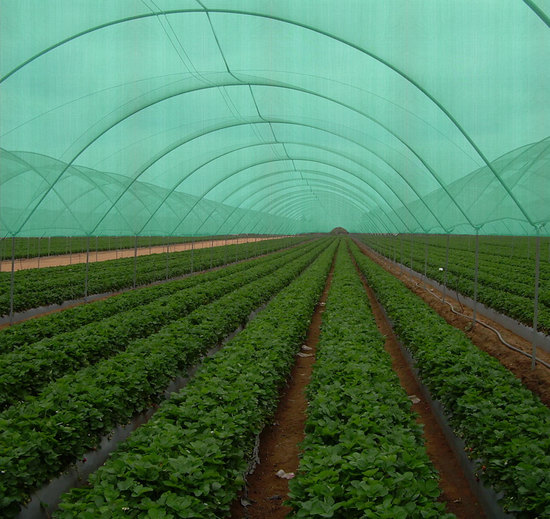#Monofilament-Shade-Net-manufacturers #Sona-Agrotex Monofilament shade nets are specialized netting materials made from monofilament yarns, which are single, continuous strands of synthetic material. These shade nets are commonly used in agriculture, horticulture, and other outdoor applications to provide shade and protection to plants, crops, and other objects. Some of the benefits of monofilament shade nets include: Sunlight Regulation: Monofilament shade nets provide regulated shading, allowing growers to control the amount of sunlight that reaches their plants or crops. This is particularly important in hot and sunny climates, where excessive sunlight can cause damage to plants or crops, such as sunburn, wilting, or reduced photosynthesis. By providing shade, monofilament shade nets help to create a favorable environment for plant growth and development. Temperature Regulation: Monofilament shade nets can help to regulate temperature by reducing the amount of direct sunlight and heat that reaches the covered area. This can help to prevent overheating and reduce the risk of heat stress or heat-related damage to plants or crops. Monofilament shade nets can also provide insulation during colder weather, helping to retain heat and create a microclimate that promotes optimal plant growth. UV Radiation Protection: Monofilament shade nets are typically designed to block a significant portion of harmful ultraviolet (UV) radiation from the sun. UV radiation can be detrimental to plants, causing leaf burn, DNA damage, and other adverse effects. Monofilament shade nets provide a protective barrier against UV radiation, reducing the risk of UV-related damage to plants or crops. Pest and Insect Control: Monofilament shade nets can serve as a physical barrier to pests and insects, preventing them from accessing and damaging plants or crops. This can help reduce the need for chemical pesticides, promoting environmentally-friendly and sustainable farming practices. Wind and Storm Protection: Monofilament shade nets can also provide protection against strong winds, reducing the risk of physical damage to plants or crops from wind-blown debris or gusts. Additionally, monofilament shade nets can help to diffuse the impact of heavy rainfall, reducing soil erosion and waterlogging, and promoting better water management. Durability and Longevity: Monofilament shade nets are typically made from high-quality, UV-stabilized materials that are resistant to environmental degradation, such as sun exposure, moisture, and temperature fluctuations. This makes them durable and long-lasting, providing reliable and consistent performance over an extended period of time. Easy Installation and Maintenance: Monofilament shade nets are generally easy to install and maintain, with options for different attachment methods, such as clips, ropes, or ties. They are also easy to clean and can be reused season after season, making them a cost-effective solution for providing shade and protection to plants or crops. Overall, monofilament shade nets offer several benefits in agriculture, horticulture, and other outdoor applications by regulating sunlight, temperature, UV radiation, and pests, while providing durability, easy installation, and low maintenance requirements. However, it's important to consider the specific requirements of your application and consult with experts or manufacturers for proper selection, installation, and maintenance of monofilament shade nets.
Chat with us on WhatsApp
×
This is your website preview.
Currently it only shows your basic business info. Start adding relevant business details such as description, images and products or services to gain your customers attention by using Boost 360 android app / iOS App / web portal.
https://www.sonaagrotex.com/newdelhi/latest-update/monofilament-shade-net-manufacturers-sona-agrote/288
#Monofilament-Shade-Net-manufacturers #Sona-Agrote...

2023-04-18T08:54:17
#Monofilament-Shade-Net-manufacturers #Sona-Agrotex Monofilament shade nets are specialized netting materials made from monofilament yarns, which are single, continuous strands of synthetic material. These shade nets are commonly used in agriculture, horticulture, and other outdoor applications to provide shade and protection to plants, crops, and other objects. Some of the benefits of monofilament shade nets include: Sunlight Regulation: Monofilament shade nets provide regulated shading, allowing growers to control the amount of sunlight that reaches their plants or crops. This is particularly important in hot and sunny climates, where excessive sunlight can cause damage to plants or crops, such as sunburn, wilting, or reduced photosynthesis. By providing shade, monofilament shade nets help to create a favorable environment for plant growth and development. Temperature Regulation: Monofilament shade nets can help to regulate temperature by reducing the amount of direct sunlight and heat that reaches the covered area. This can help to prevent overheating and reduce the risk of heat stress or heat-related damage to plants or crops. Monofilament shade nets can also provide insulation during colder weather, helping to retain heat and create a microclimate that promotes optimal plant growth. UV Radiation Protection: Monofilament shade nets are typically designed to block a significant portion of harmful ultraviolet (UV) radiation from the sun. UV radiation can be detrimental to plants, causing leaf burn, DNA damage, and other adverse effects. Monofilament shade nets provide a protective barrier against UV radiation, reducing the risk of UV-related damage to plants or crops. Pest and Insect Control: Monofilament shade nets can serve as a physical barrier to pests and insects, preventing them from accessing and damaging plants or crops. This can help reduce the need for chemical pesticides, promoting environmentally-friendly and sustainable farming practices. Wind and Storm Protection: Monofilament shade nets can also provide protection against strong winds, reducing the risk of physical damage to plants or crops from wind-blown debris or gusts. Additionally, monofilament shade nets can help to diffuse the impact of heavy rainfall, reducing soil erosion and waterlogging, and promoting better water management. Durability and Longevity: Monofilament shade nets are typically made from high-quality, UV-stabilized materials that are resistant to environmental degradation, such as sun exposure, moisture, and temperature fluctuations. This makes them durable and long-lasting, providing reliable and consistent performance over an extended period of time. Easy Installation and Maintenance: Monofilament shade nets are generally easy to install and maintain, with options for different attachment methods, such as clips, ropes, or ties. They are also easy to clean and can be reused season after season, making them a cost-effective solution for providing shade and protection to plants or crops. Overall, monofilament shade nets offer several benefits in agriculture, horticulture, and other outdoor applications by regulating sunlight, temperature, UV radiation, and pests, while providing durability, easy installation, and low maintenance requirements. However, it's important to consider the specific requirements of your application and consult with experts or manufacturers for proper selection, installation, and maintenance of monofilament shade nets.
2023-04-18T08:54:17
Keywords
- hot
- need
- ties
- risk
- time
- pests
- gusts
- ropes
- clips
- crops
- season
- impact
- plants
- amount
- insects
- growers
- sunburn
- experts
- options
- reduced
- moisture
- reliable
- solution
- leaf burn
- Longevity
- Durability
- insulation
- DNA damage
- agriculture
- heat stress
- development
- overheating
- horticulture
- sun exposure
- microclimate
- soil erosion
- Sona-Agrotex
- waterlogging
- covered area
- strong winds
- other objects
- sunny climates
- heavy rainfall
- colder weather
- Insect Control
- extended period
- direct sunlight
- physical damage
- Storm Protection
- physical barrier
- proper selection
- water management
- several benefits
- Easy Installation
- UV-related damage
- regulated shading
- wind-blown debris
- protective barrier
- excessive sunlight
- synthetic material
- monofilament yarns
- Sunlight Regulation
- heat-related damage
- chemical pesticides
- significant portion
- optimal plant growth
- favorable environment
- specific requirements
- other adverse effects
- Temperature Regulation
- consistent performance
- UV Radiation Protection
- Monofilament shade nets
- temperature fluctuations
- environmental degradation
- single, continuous strands
- other outdoor applications
- low maintenance requirements
- different attachment methods
- sustainable farming practices
- specialized netting materials
- harmful ultraviolet (UV) radiation
- Monofilament-Shade-Net-manufacturers
- high-quality, UV-stabilized materials

Submit Your Enquiry